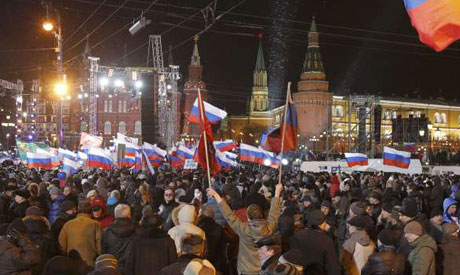
People hold a rally in support of Russia's current Prime Minister and presidential candidate Vladimir Putin in Manezhnaya Square near the Kremlin in central Moscow March 4, 2012. (Photo: Reuters)
Thousands thronged a Moscow avenue Saturday for new protest against Vladimir Putin's domination of Russia but the rally struggled to match past demonstrations after his crushing election victory.
In a sign that the opposition is struggling to maintain its momentum after Putin won a third Kremlin term in March 4 polls, the rally gathered only a fraction of previous rallies in Moscow attended by at least 100,000 people.
The Moscow city hall had approved a demonstration of up to 50,000 people on the New Arbat street in central Moscow but police put the number at 10,000.
One of the protest leaders, liberal politician Vladimir Ryzhkov, told the rally that 25,000 people had come, although AFP correspondents said the figure appeared to be well below this.
Speakers ranging from former world chess champion Garry Kasparov and radical leftist leader Sergei Udaltsov sought to mobilise the crowds as the opposition tries to find a clear unified strategy against Putin.
"The worst thing that can happen is that we get demoralised and say that the authorities have won," said Kasparov. "We have experienced resistance for the first time and it is just the start."
The protest leaders, many of whom had observed the polls, claimed there were huge violations in the elections and repeatedly said that neither the ballot nor Putin's election to president were legitimate.
"That person who cries crocodile tears, can you call him an elected president?," asked Udaltsov, referring to the tears Putin now famously shed in his victory speech.
He urged people to turn out for more rallies in central Moscow leading up to the "pretender" Putin's inauguration as president in May.
But journalist and television presenter Ksenia Sobchak told the rally the opposition needed to clarify its demands. "We all know what we are against, we must show what we are for," she said, to whistling from some in the crowd.
Those attending the rally said they came because of the need to keep up pressure on the authorities.
"The people who are here have realised that they have rights and that these are being violated. More people need to do the same," said Lyudmila Zaichik, 18.
"We need to show that people aren't resigned, that the movement won't disappear," said student Arkady Serinkin, 22.
The protest comes a day after US President Barack Obama telephoned Putin to congratulate him on his election victory, in a call that came several days after other world leaders but underlined the importance of the relationship.
The controversy over elections and the demonstrations has on occasion tested US-Russia relations, with Putin accusing Washington of funding NGOs with the aim of questioning the polls and sparking protests.
Police were highly visible in Moscow Saturday, lurking in buses parked around the city after the last rally on March 5 ended in mass arrests when some protestors refused to leave the venue.
According to Moscow police, some 2,500 members of the security forces were on duty for the rally. They warned of plans by "certain groups" to light flares, block roads and put up tents.
Police also detained several dozen at an unsanctioned march with around 250 people Saturday in the northwestern city of Saint Petersburg, an AFP journalist witnessed.
After holding four mass protests over the last three months and successfully breaking the taboo against opposition rallies in Russia, the movement now faces a huge challenge to decide where to go from here.
The involvement of nationalist leaders and the sometimes inflammatory rhetoric of one of the most charismatic of the opposition leaders -- the anti-corruption crusader Alexei Navalny -- has also discomfited some liberals.
"We need to be honest with ourselves. Changes are not going to be swift and will need long and hard political work," wrote Andrei Kolesnikov, commentator of the anti-Kremlin Novaya Gazeta newspaper.
Putin, currently prime minister, won 63.6 percent of the vote in the elections and is now preparing for a May inauguration to take back the Kremlin job he held from 2000-2008 from his protege Dmitry Medvedev.
Short link: